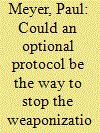| Srl | Item |
| 1 |
ID:
179861


|
|
|
|
|
| Summary/Abstract |
Since the early 1980s, the United Nations General Assembly and its affiliated forum, the Conference on Disarmament in Geneva, has had the Prevention of an Arms Race in Outer Space issue on its agenda. In the intervening years, the threat of weapons being introduced into the outer space realm has waxed and waned, but, in the main, a benign environment free from man-made threats has prevailed, allowing for great strides in the exploration and use of space. Recently, a renewal of great power rivalry including the development of offensive “counter-space” capabilities has resurrected the spectre of armed conflict in space. With widespread political support for the non-weaponization of outer space, has the time come to give legal expression to this goal by means of an optional protocol to the 1967 Outer Space Treaty?
|
|
|
|
|
|
|
|
|
|
|
|
|
|
|
|
| 2 |
ID:
192888


|
|
|
|
|
| Summary/Abstract |
This article outlines historical shifts in US and Canadian space policies using the sanctuary-contested policy framework. It highlights how sanctuary policies were born out of necessity rather than the pursuit of a peaceful global commons; they were never intended to, and did not, prevent the militarization and weaponization of space. The paper then describes challenges to global space governance and argues that diplomacy will not prevent conflicts in space. After introducing elements of deterrence theory, this paper concludes that Canada should move beyond the sanctuary ideology, make space a national whole-of-government issue, and align its space policy and strategy with allies and partners, credibly communicating Canada's resolve to protect and defend space assets. It further recommends that Canada develop niche capabilities that contribute to more effective national and collective deterrence and defence in space. Those capabilities should build upon existing niche strengths, not create space debris, and leverage industrial innovation in space.
|
|
|
|
|
|
|
|
|
|
|
|
|
|
|
|